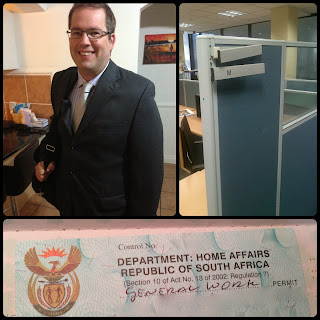October 1, 2013
Or, the elephant on the blog, as the case may be. I've now officially been on the South African payroll for six months, and I have yet to discuss the professional side of my world here. While this admittedly was partly a conscience omission, I want to explain it a bit further, as ultimately my career is the reason we are in South Africa in the first place.
I started this blog as a means to explore, document and capture all aspects of our experience here, and so I think it's time I open this can of worms.
Firstly, why haven't I delved into the "work" side of things yet?
It's boring. I realize the vast majority of people reading this blog are our friends and family and that they are interested in reading stories of the things we are doing and seeing photos of us exploring new places. Let's face it: reading a 2000-word monologue on my challenges and experiences with Broad-Based Black Economic Empowerment ratings, the supplier development movement, and the impact of transformation on extrinsic motivation of today's workforce...probably doesn't qualify as light entertainment.
I'm finding new balance. When I arrived in the office here in Johannesburg and met with the lead partner of the practice I was joining, he said to me (I'm massively paraphrasing, but this is the gist of it) that if he were me, delivery would not be his number one goal. In his mind I am here for the cultural experience, and if all I'm focusing on is work, I'm not going to get that. While doing well here is critical, his definition of that doesn't mean forgoing everything else in my life. It means striking a balance so that I gain the full benefits of being here from both a professional and a personal perspective. If every ounce of my energy is focused on work, I will be foregoing pieces and chunks of this incredible experience at every turn, which add up to a huge missed opportunity. All of the random adventures this blog showcases represent how we're going about making this as well-rounded of an experience as we possibly can.
I live it every day. When I blog, it's my fun time. It's my time to think about and spend time doing something else. I spend so much time at work thinking about things and analyzing them that at the end of the day I need to turn my brain over to something else for awhile.
Having said all of that, if I omit the career-side of our experience, I'm only showing one piece of the pie that make up our lives here. Part of why I wanted to live abroad in the first place was to work somewhere new as I think that's when the rubber meets the road in terms of how you really see, feel and begin to understand the differences between "here" and "there".
One of the most difficult questions for me to answer is probably "how is work going?". This isn't because it's a complicated answer or because the transition has been tough. It's because I find it hard to genuinely express how positive this experience has been, how much I have learned about myself, and how much I have grown professionally in this short space of time.
The thought processes, the business environment, the office culture, they are all different and new to me. It has been an eye-opening and humbling experience that is stretching me everyday to look at things in a new light. While I have found balance in a different way in South Africa than I did in Canada, I would be giving the wrong impression if I gave the appearance that my career is suddenly less important to me. Quite the opposite actually. It is at the crux of why we came here and I know this experience is not only going to stay with me throughout my career, but more importantly, it is going to shape my career. And whatever shape it takes, I'm up for the challenge.






















